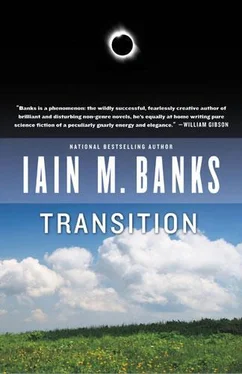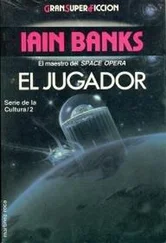Madame d’Ortolan nodded to herself. She took a deep breath. “Thus far, this has not worked out as we intended.”
“No, ma’am.”
She was silent for a few moments. A bird cooed somewhere overhead, and wings rustled. Sometimes, when one of the birds in the aviary was unwell or had been injured and was hopping about on the floor of the structure, broken-winged or too ill to fly, Madame d’Ortolan would let the cats in, to dispose of the creature. She always enjoyed the resulting kerfuffle, brief though it usually proved to be. She twisted in her chair and looked at Kleist. “What would you do, Mr Kleist? If you were me?”
Without hesitation he said, “We find ourselves fighting on two fronts, ma’am. That is not supportable. I would indefinitely postpone the actions against the Council members and withdraw all but the basic tracking teams involved. Throw everything at Oh. He’s the greater threat.”
Madame d’Ortolan narrowed her eyes. “Mr Kleist, I have worked for decades to get to just this point with the Central Council. If we don’t act now there is every chance they will approve the sort of invasively damaging policies that the Mulverhill woman has obviously been insinuating into the vacuous heads of an entire generation of students, technicians and agents for a decade or more. There are too many Mulverhills out there and their influence is growing. I can’t keep swatting them away from all positions of influence for ever. We have to act now. We may not get another chance.”
Kleist looked unimpressed. “Ma’am, I think the moment has passed, for now. Another may present itself in time. In the meantime, nobody seems to have any proof that you were behind the actions against the other Council members, or be prepared to speculate openly on the matter, so we have established, as it were, a stable front there. Mr Oh, especially if he is allied with Mulverhill, is an immediate and dynamic threat. Also, once he’s dealt with, we may be able to make it look as though he and Mulverhill were behind the attacks on the Council members.”
Madame d’Ortolan unwound herself in her seat to sit forward again, looking away from him. She released a long, deflating sigh. “Sadly, annoyingly,” she said in a quiet voice, “I think you’re right.”
Mr Kleist was silent for a few moments. His expression did not change. He said, “Shall I issue the relevant orders?”
“Please do.”
He turned to go.
“Mr Kleist?”
He turned back. “Ma’am?”
Madame d’Ortolan had turned to look at him again. “I take this very personally, and very ill. I shall expect Mr Oh to pay for this, in person. Once he has served whatever other purposes we require of him, I think I might ask you to tutor me in some of the techniques you employed in your earlier profession, so that I might apply them to him. And Mulverhill, for that matter. I severely doubt she’s innocent in all this.”
Mr Kleist gave a small bow. “I am at your disposal, ma’am.”
There was a small smile on Madame d’Ortolan’s thin lips. Her paper-cut smile, as he thought of it. The image brought with it, as it always did, the memory of the scent of lemons and the echo of long-faded screams. She waved one hand. “Thank you. That’ll be all.”
He turned again and had walked more two steps when she said, “Mr Kleist?”
He turned and looked back, still untroubled. The lady was known for using this little technique. “Yes, ma’am?”
The birds were almost silent now, settled in for the night.
“What was it they used to call you? The Moralist, was it?”
“The Philosopher, ma’am.”
“Ah, yes. So, was it agreeable, to be taking up your old profession again?”
He looked at her for a moment. “Why, ma’am,” he said quietly, “we barely began.” He regarded her a moment longer. “But no, not especially.” He bowed and walked away.
The Pitcher
Mike Esteros is sitting at the bar of the Commodore Hotel, Venice Beach, after yet another unsuccessful pitch. Technically he doesn’t know it’s unsuccessful yet, but he’s developing a nose for these things and he’d put money on another rejection. It’s starting to get him down. He still believes in the idea and he’s still sure it’ll get made one day, plus he knows that attitude is everything in this business and he must remain positive – if he doesn’t believe in himself, why should anybody else? – but, well, all the same.
The bar is quiet. He wouldn’t normally drink at this time of day. Maybe he needs to adjust the plot, make it more family-oriented. Focus on the boy, on the father – son thing. Cute it up a little more. A dusting of schmaltz. Never did any harm. Well, no real harm. Maybe he’s been believing too much in the basic idea, assuming that because it’s so obvious to him what a beautiful, elegant thing it is it’ll be obvious to everybody else and they’ll be falling over themselves to green-light it and give him lots of money.
And don’t forget Goldman’s Law: nobody knows anything. Nobody knows what will work. That’s why they make so many remakes and Part Twos; what looks like lack of imagination is really down to too much, as execs visualise all the things that could go wrong with a brand new, untested idea. Going with something containing elements that definitely worked in the past removes some of the terrifying uncertainty.
What Mike’s got here is a radical, left-field idea. The central concept is almost too original for its own good. That’s why it needs a generous helping of conventionality slathered over it. He’ll rework it, again. It’s not a prospect that fills him with joy, frankly, but he guesses that it has to be done and he has to struggle on. It’s worth it. He still believes in it. It’s just a dream, but it’s a dream that could be made real and this is the place where that happens. Your dreams – not just of your idea but of your future self, your fortunes – get turned into reality here. He still loves this place, still believes in it.
Mike leaves the bar, goes outside and sits on a bench, watching the ocean, watching the people pass on the tarmac strip and on the sands themselves, roller skating, boarding, strolling, playing Frisbee, just walking.
A girl comes and sits on the bench too. Well, woman. She might be Mike’s age. He starts talking to her. She’s cute and friendly and smart, rangy and dark, nice laugh. Just his type. A lawyer, on a day off, just relaxing. Monica. He asks does she want a drink and she says maybe a herbal tea and they sit in a little café still within sight of the beach. Then they go for dinner in a little Vietnamese place a short walk away. Mike gives her the pitch because she’s genuinely interested. She thinks it’s a great idea. It actually seems to make her thoughtful.
Later they walk on the beach in the light of a half-moon, then sit, and there’s some kissing and a modest amount of fooling around, though she’s already told him she doesn’t go any further on a first date. Him too, he tells her, though strictly speaking that’s nonsense and he guesses that she guesses this but doesn’t care.
Then, in the middle of a tight, embracing kiss, something changes. He feels it happen, and when he opens his eyes the moon has gone, the air feels cooler and the beach looks narrower and steeper and leads down to a sea that’s much calmer than the one that was there just seconds ago. There are islands out there, dark shapes under the stars, covered in trees. He shakes his head, looks at Monica. He starts back instinctively, crabbing away from her on all fours. She’s changed completely too. White, blonde, shorter, face quite different. There are a couple of guys – the only other people on the beach – standing massively about ten feet away, watching them.
Читать дальше












